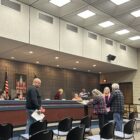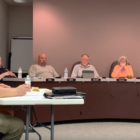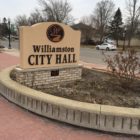Government
Fenton City Council discusses mobile vendor ordinance
|
Citizens and officials gathered on June 12 to discuss and work to approve or deny the ordinance that discusses food truck licensing and regulation in the city. Regulation is speculated for whether or not food trucks and vendors should be required to be licensed to operate in the city or for special occasions. The ordinance, which is labeled as No. 714 mobile vendor ordinance, and states it will “secure public health safety and general welfare of the residents and property owners of the City of Fenton…by regulating Mobile Vendors within the City and to repeal all ordinances or parts thereof in conflict within.”
The process, if approved, will have the steps of verifying the relevant code pertaining to the operating mobile vendor, determining if a certification is required, if required then payment of fees and application and then adhering to vending requirements and finally verifying the zoning compliance.
City council members have not come to a conclusion.
Fenton city attorney Chris Patterson said in a city council meeting: “We’re going to create an application form and I think the application form will also help and then have to set a checkbox that will say, ‘are you doing this?’ If not, you don’t need to do this and ‘are you doing this?’, proceed to complete this section. They’re designed to sort of make this licensing system work easier because we are asking individuals to potentially, in a certain scenario, complete a license.”
Patterson advised the city council on the overall process of the food truck ordinance and the process on how to achieve its licensing and approval to operate in the city of Fenton.
“Consistent as a peddler and a solicitor’s license, they also have to coordinate with the property owner to get a special event zoning permit,” said Patterson.
Food truck ordinances come into place because of various reasons.
“We did have complaints about the generators and the trash,” Fenton Mayor Sue Osborn said at the meeting.




